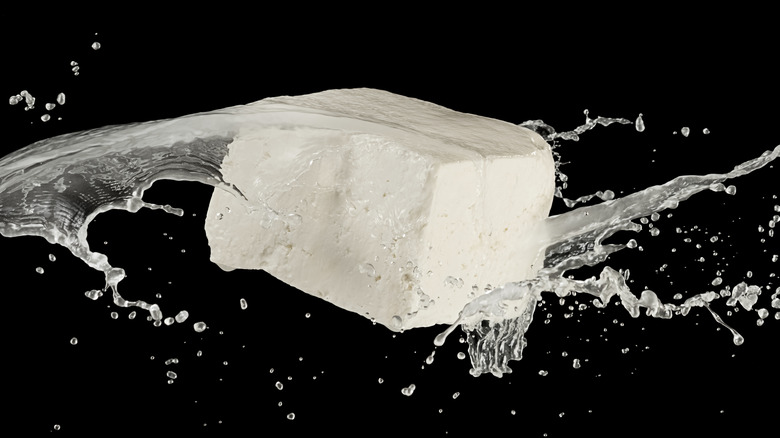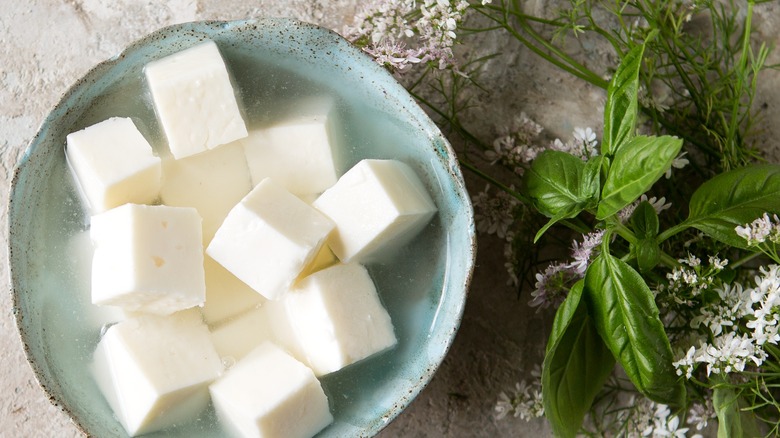That Salty Brine Truly Is The Key To Keeping Feta Fresh For Longer
Feta is a handy thing to have stocked in the fridge, but unless you're eating an entire block in one go (a la the baked feta pasta TikTok trend), you'll need to know how to save your feta properly to make the most out of your cheese. Most fetas come packaged in a brine; if they don't you really shouldn't bother with them unless you like dry, sour, crumbly cheese (and you probably don't).
Feta cheese is typically a goat and/or sheep's milk cheese and uniquely flavored, partly to do with the fact that it sits in salt water for its natural life. This brine not only helps to preserve the moisture and stave off harmful bacteria, it also contributes to the flavor. It's preferable to buy feta in blocks instead of crumbles for a couple of reasons: Blocks are easier to keep fresh, and you'll probably end up paying a little extra for pre-crumbled stuff — truly a lose/lose situation.
How long does feta last?
Many fetas you find in the store come in a vacuum-sealed package with an insignificant amount of brine, because the seal removes air and a little brine is all that is required for shelf stability. Unopened feta in this state will stay good for around a month; however, as soon as the seal is broken you have no more than a week before the cheese will turn. Unless, of course, you return the cheese to a brine. Most feta packaging is not reusable, so if you have more cheese than you need at any one time, simply store it in an airtight container. Fill the container with one teaspoon of salt per cup of water used, and be sure that the feta is completely covered by the brine before popping it into the fridge. This way it will stay fresh for up to a month.
If you're working with crumbles you can do the same thing, but freezing them also optimizes freshness. Feta will last frozen for up to three months, but note that it may change the flavor and texture of the cheese, affecting its future application. Once-frozen cheese may not make a great fresh garnish, but it's perfect for omelets or other cooked dishes. If freezing crumbles, it's recommended that you pre-freeze them on a baking sheet before transferring to a ziplock bag to keep them from freezing together.
Spoilage and brine uses
Sometimes, despite our best efforts, food spoils. So how do you tell when your feta has gone off? It's cheese, so it's always going to be a little funky — but there are some definite tell-tale signs of spoilage. The first and foremost of these is mold. If you see any discoloration, or (shudder to think) hairy bits on the cheese, then you're better off chucking it in the bin. Smell is the second indicator of how good your feta is. If the cheese smells acrid or extra sour, it's done. If its odor smacks of spoiled milk, toss it. That smell is unmistakably rotten, and it'd be shocking if you could even get a bite of it down before knowing something was wrong. Lastly, check your feta for sliminess, for obvious reasons.
If you're all about waste reduction, good news –- feta brine is delicious and can be used for all kinds of things, not just keeping cheese fresh. Consider adding feta brine to the water of your next batch of rice or beans. It's terrific for chicken — next time you're planning on frying up a batch of chicken, try refrigerating your meat in the feta brine for extra tenderness and flavor. Feta brine is also perfect for flavoring up crispy tofu: Simply soak the tofu in the brine for a couple of hours before popping into the air fryer for an extra crispy texture.


